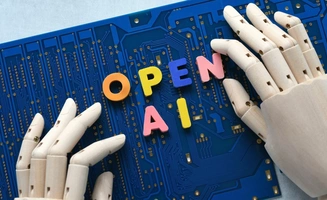🌍 Save the Date: International Virtual Open House – April 3rd! Discover our English-taught programs through live webinars, meet program directors, interact with current students, and get personalized answers from our expert teams. Register now!
Hi ChatGPT! Can you replace a consultant?

Over the last months, it has been nearly impossible to avoid ChatGPT. According to THE WRAP, it has cracked the top 50 global websites list since its launch on November 30, 2022, with over 672 million visits in January. It is the newest AI powered revolution which can use an enormous database to do anything – from writing well-structured answers and solving math problems to even creating computer code. But will it also reshape the consulting industry? Can it fully replace the work of a human consultant? We asked ChatGPT!
Current implementation of AI in consultancy firms
Use of AI is nothing new in the consulting industry, in fact it has been using artificial intelligence for quite some time. AI allows the analysis of big sets of data quickly and can detect deviations as soon as they arise. Its evaluations are unbiased and free from human errors, ensuring consistency and accuracy. According to Harvard Business Review, a key difference is that the current AI systems not only analyze data, but also perform tasks like visual image recognition and inspection, autonomous operations, and generation of new content; all are tasks that generally apply to an average consulting mission.
Still, this is not enough to replace a human consultant, says Vishwanath Gujar, former consultant with an experience of 7 years at KPMG and EY.
“Use of AI specifically helps you with the data analytics part by raising red flags after the evaluation of outcomes. It cannot give you a complete observation of the client’s situation. For that you need human interpretation.”
In fact, human skills are still superior to those of AI in several areas. For instance, the primary concern for consultants is to develop interpersonal relationships with clients, which can currently only be achieved by creating a trustful environment through human interactions. Furthermore, AI still falls short on contextual reasoning, the ability to take multiple factors from different fields into account to arrive at the correct conclusion, interpretation of data, and decision-making.
“The current AI systems are no decision-makers. They can give you the outcome of data analysis, but neither explain the values nor what they indicate. For decision-making you need to have a complete observation of a particular process in the context of the client,” says Gujar.
AI works on fixed assumptions, which can pose problems when entering exceptional situations. As an example, sales during Christmas are different than sales in the rest of the year, for which trustworthy customers might naturally benefit from a delay in payment. It is something a supplier might accept, whereas AI would still block the client for further sales.
What is changing with ChatGPT?
The development of ChatGPT is revolutionizing the use of artificial intelligence technology. The two key differences between ChatGPT and the previously implemented AI systems is that it can now understand the context of the given input of data to generate an appropriate reply, thereby giving a coherent sequence of words and sentences. That means ChatGPT can better interpret the given data and provide actual recommendations in an understandable manner, a massive breakthrough in the development of AI. But is this sufficient for ChatGPT to become a consultant?
“No.” says Gujar. “With ChatGPT, it is now possible to input a certain company scenario, for example regarding an issue with the ratios of inventory in connection to sales. Depending on the input, ChatGPT can give you the current risk and recommend corrective measures. However, these are low-level interpretations and more general measures that may not be the best solution in specific cases.”
The key takeaway here is that ChatGPT is just a couple of months old and is already giving recommendations to posed questions. Even if this is currently on a simple level, we should beware of the level of recommendations in 10 or 20 years. Can ChatGPT reach a point where it can deliver the same consulting service as humans?
Hi ChatGPT! Can you replace a consultant?
The short answer is – YES! Although currently not sophisticated enough to replicate the skills of a human, needed to replace a consultant, ChatGPT lists all the challenges posed to achieve that goal:
- Developing a deeper understanding of human emotions and dynamics
- Building more advanced natural language processing capabilities
- Improving creativity and the ability to generate novel ideas
- Building more advanced decision-making capabilities that can account for complex trade-offs and uncertainty
- Developing better mechanisms for explaining and communicating recommendations to clients
As per ChatGPT, it is difficult to predict the exact timeline to reach such a level of sophistication, needed to overcome these challenges.
“However, it is likely to be a gradual process that evolves over time as AI continues to improve and businesses become more comfortable with its capabilities,” says ChatGPT.
Will this become the reality of the future? Contrary to the opinion of ChatGPT, Gujar doubts that it will ever be able to improve its skills to the level of a human and so give the same quality of recommendations. But who is right?
Should consultants fear the loss of their jobs?
Yes, according to Gujar, as AI is exponentially developing, it will certainly take over tasks currently performed by humans. Mid-level jobs will be the most affected – consultants who do not have the foresight to develop their niche audience and people skills will be the first to be replaced by AI, as their job roles will be confined to analysis of data. Consulting firms are always striving to increase their accuracy in the services provided and AI is an essential tool to reach that goal.
So, should consultants treat AI as an ally or enemy?
You decide.
By Lennard Hofmann, Neriman Yilmaz, Ashutosh Jamwal